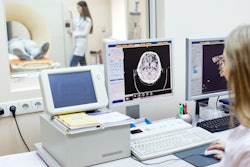Wednesday, November 28 | 12:45 p.m.-1:15 p.m. | BR266-SD-WEB6 | Lakeside, BR Community, Station 6
Screening breast MRI could be an effective tool for women with an intermediate risk of breast cancer, according to this poster being presented on Wednesday afternoon.Dr. Min Sun Bae of Memorial Sloan Kettering Cancer Center in New York City and colleagues assessed 9,208 breast MRI exams performed between 2010 and 2012, categorizing the exams by the following risk categories (percentages reflect how many women were in each category):
- High risk: Known BRCA1 or BRCA2 mutation or untested first-degree relative of known BRCA carrier (10.5%)
- High risk: History of chest radiation (2.5%)
- High risk: At least 20% lifetime risk of the disease (26.5%)
- Intermediate risk: Personal history of breast cancer (57.7%)
- Low risk: Less than 20% lifetime risk (2.8%)
Breast MRI's cancer detection rate was highest in the BRCA group, at 19.5 cancers per 1,000 exams. This was followed by those with a history of chest radiation (17.7 per 1,000 exams), the group with a high lifetime risk (14.3 per 1,000), the group with a personal history (10.2 per 1,000), and the low-risk group (7.8 per 1,000).
But Bae's team also found that breast MRI's sensitivity was higher in intermediate-risk women (88.7%) than high-risk women with known BRCA mutations (79.2%). Specificity was highest in the intermediate-risk group (92.5%) and lowest in the BRCA group (86.1%).
The results suggest that women with an intermediate risk of breast cancer could benefit from MRI, the researchers concluded.
"Screening MRI may be possibly expanded to women at intermediate risk of breast cancer such as [those with] a personal history of breast cancer or high-risk lesion," they wrote.




.fFmgij6Hin.png?auto=compress%2Cformat&fit=crop&h=100&q=70&w=100)




.fFmgij6Hin.png?auto=compress%2Cformat&fit=crop&h=167&q=70&w=250)











